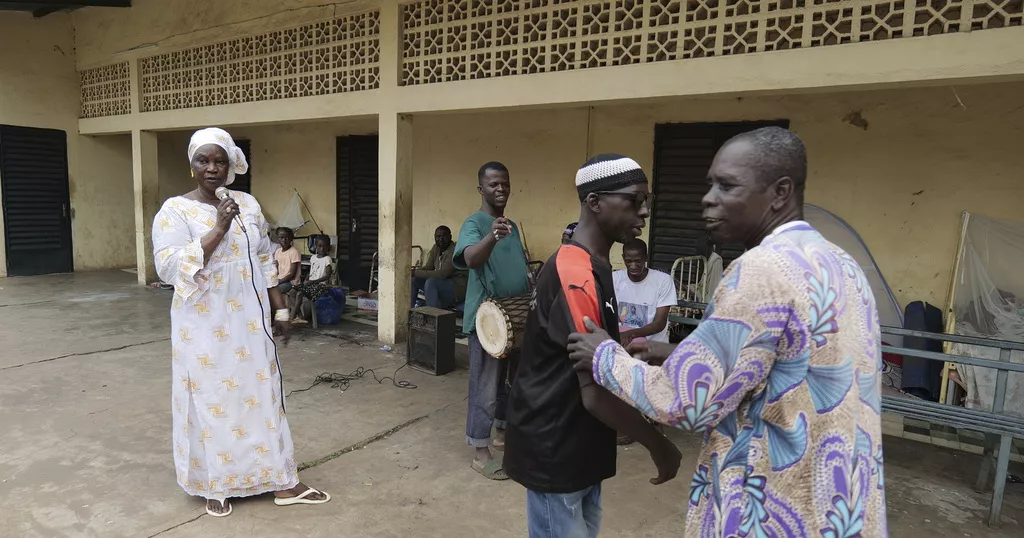Empowering Voices: How Theater Transforms Mental Health Care in Mali
3 min read

In the courtyard of the psychiatric ward at one of Bamako’s major hospitals, a vibrant scene unfolds as patients engage in a spirited performance. To the rhythm of a djembe, a traditional West African drum, they dance and act out scenarios that reflect village life and community disputes.
Among the participants is Mamadou Diarra, a young patient who passionately exclaims in Bambara, “Hee hee ha ha ha ha! You don’t know anything! Just nonsense!” His playful banter is met with laughter, and soon he is dancing while delivering playful insults to his fellow performers. This lively interaction is part of Koteba, a traditional form of theater embraced by Mali’s largest ethnic group, the Bambara.
Koteba combines acting, singing, and dancing and is often performed in villages as a means to address social issues while providing a platform for satire. Here at Point G, one of Bamako’s largest hospitals, this art form serves a dual purpose: it supports psychiatric patients and fosters a sense of community among those receiving care.
The theater troupe introduced Koteba to the Point G psychiatric ward in 1983, and since then, patients and actors have gathered every Friday to engage in this transformative practice. Diarra, who considers himself the star of the show, expresses his newfound passion, saying, “I’ve never done any kind of theater before. I’ve never danced. But once I started, God gave me the knowledge of these things.”
Adama Bagayoko, the head of the theater troupe, listens and responds with warmth, “Okay, we’ll lighten that load for you.” Bagayoko, 67, was among the original actors who brought Koteba to Point G, aiming to leverage Mali’s cultural traditions to aid those receiving psychiatric treatment.
According to a 2022 report by the World Health Organization, Mali has fewer than 50 mental health professionals for a population exceeding 20 million. As a result, many individuals with mental health issues find themselves without adequate care and face societal exclusion.
Bagayoko emphasizes the significance of Koteba, stating, “When they come here and see through the Koteba that they aren’t excluded, we give them the floor. We touch each other, we talk to each other, we dance together, we laugh together. This is the importance of Koteba. To touch someone shows that we are equal. To listen to them shows that they are important, and what they say matters.”
The performances at Point G unfold in three distinct phases. First, the troupe plays music to invite patients into the courtyard. Next, they solicit input from participants regarding the topic or theme for that day’s performance. Following the enactment, the circle opens up for patients to share their thoughts, creating a safe space for dialogue.
Souleymane Coulibaly, a clinical psychologist at Point G, remarks on Koteba’s unique ability to facilitate expression among patients. “Koteba is a traditional technique that was developed in the Bambara culture to address social problems, which are often dramatic, with the goal of de-dramatizing them,” he explains. The relaxed atmosphere encourages patients to disclose personal experiences they may hesitate to share with family or healthcare providers.
During a typical performance, patients reenact a common scenario in Malian society: a villager accused of theft must navigate the ensuing chaos. As community members gather in anger, the accused makes a desperate escape, illustrating a familiar dynamic that resonates with the audience.
While the political turmoil stemming from the 2020 military coup and rising extremist violence in Mali looms just a short distance away—close to the presidential palace and main military base—the Koteba performances provide a refuge. In this creative space, Diarra and his fellow patients immerse themselves in the narratives they create, leaving behind the challenges of their daily lives.
Through Koteba, these patients not only find their voices but also experience a sense of belonging and community, transforming their mental health journey into one of empowerment and resilience.